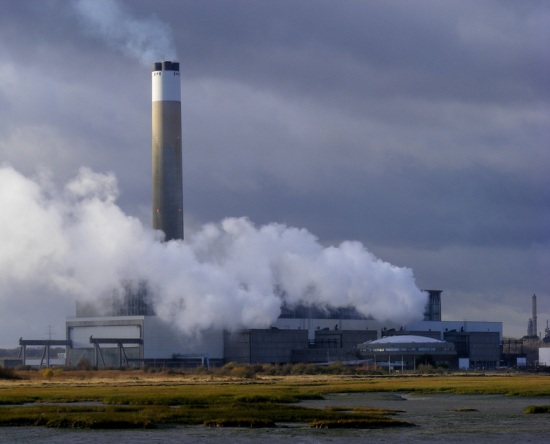In the past decade or so, disturbed weather patterns and rising ocean levels have led to concerns about the effect human activity is having on the planet, specifically in the field of global warming. Widespread campaigns to encourage the use of public transport rather than driving to work, the erection of wind turbines across the country and investigations into the harnessing of wave power to produce electricity have become common features of modern life in the UK.

Fawley Power Station
Yet it seems that not even these concessions to environmentally friendly living have been enough to meet the Government’s environmental targets for Britain, with the result that a number of coal and oil-fired power stations will close nationwide next month. One of these is located in Fawley, Hampshire, and was instrumental in providing power for a million homes after supplies ran low on the 16th January – should a situation like this arise after the closures take effect, the UK will be forced to make extra gas purchases at great expense from other global markets.
Unfortunately, one-off shortages such as this are the least of consumer’s worries, according to the energy regulator. Ofgem has warned that the National Grid may not be able to fully meet demand between 2015 and 2020 as a result of upcoming power station closures, and as a result consumers will once more face the prospect of a steep rise in energy bills to cover the cost of importing gas.
The closures mean that consumers will now rely more than ever on gas to provide the electricity that powers their homes and businesses – something which could prove incredibly expensive as global demand is increasing. Furthermore, thanks to the number of countries relying on the commodity, wholesale prices are already rising and will continue to do so for the foreseeable future.
Chief executive of Ofgem, Alistair Buchanan, warns that the National Grid may at times struggle to provide the levels of electricity required, and while domestic users’ supplies will be secure “in all but the most extreme circumstances”, large commercial properties such as factories and industrial estates may find themselves facing rolling blackouts in as little as two years’ time.
Mr Buchanan says; “National Grid has managed one-off shortages in the past in a professional way.
“It will face a tougher challenge over the next few years because of the possibility of a prolonged lack of spare power station capacity.
“The big worry about gas for all consumers is what price will we have to pay to get it? Because just when we need more gas, world demand for gas is set to rise while our own supplies are predicted to fall by another 25 per cent by 2020.”
At present, only around 30 per cent of electricity generation comes from gas, with the majority of the remainder being made in oil and coal-fired power stations and a small percentage coming from renewable energy sources. However, Ofgem estimates that gas production will need to increase to between 60 and 70 per cent by 2020 thanks to a rising consumer demand combined with the closure of “dirty” power stations.
It seems that the pressure is on to up the output from renewable sources, yet the financial crisis stalled work of this nature and put the UK back several valuable years in the field of renewable energy. It is also something of a contentious issue as protesters around the country attempt to halt the installation of wind turbines in perceived beauty spots.
Therefore, Government efforts to promote energy efficiency are now “vital”, according to Mr Buchanan. Reducing demand in households by turning off lights in empty rooms and turning televisions off at the wall instead of leaving them on standby will not only ensure that commercial properties can continue to receive an adequate supply but also that annual electricity bills are kept in check.
Mr Buchanan concludes by comparing the problems National Grid face to a battle, saying consumers can help ensure victory by keeping energy efficiency in mind.
He says; “Wellington described Waterloo as a close-run thing. Let’s hope that, in the battle to keep the lights on, these measures ensure it isn’t too close.
“Victory at Waterloo came at a price and we also have to face the likelihood that avoiding power shortages will also carry a price.”
Do you think that the UK should be investing more money into renewable energy initiatives, such as wind farms and off-shore wave harnessing technology? Or would the money required to develop renewable energy fully mean consumers had to pay as much anyway? Does your place of work already have energy efficiency guidelines in place, such as shutting down computer terminals at the end of the day or replacing halogen lights with the eco-friendly long life alternatives?
Previous Post
Sunnybank Shopping Centre Sold for 27 Million Dollars